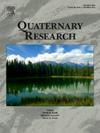New paleohydroclimate record of the MIS 5e/5d transition from Yelini Cave, central Anatolian region of Türkiye
IF 1.8
3区 地球科学
Q3 GEOGRAPHY, PHYSICAL
引用次数: 0
Abstract
This study presents the results of a detailed paleoclimate investigation on stalagmite YL-1 (Yelini Cave, Türkiye). YL-1 grew between 117.13 (+0.57/−0.44) ka and 114.87 (+1.63/−2.89) ka within Greenland Stadial 26, indicating a positive moisture balance during the stadial conditions in this semi-arid region. Rainfall is significantly affected by sub-cloud and surface evaporation and decreasing net effective winter precipitation is recorded by high isotope values. Enriched δ本文对石笋YL-1 (Yelini Cave, t rkiye)进行了详细的古气候调查。YL-1在格陵兰Stadial 26的变化区间为117.13 (+0.57/ - 0.44)ka ~ 114.87 (+1.63/ - 2.89) ka,表明该半干旱区在Stadial 26期间处于正水分平衡状态。降雨受云下和地面蒸发的显著影响,冬季净有效降水的减少由高同位素值记录。116.65 (+0.51/ - 0.39) ka的δ18O和δ13C富集被解释为发生在MIS 5e结束前约400年的干旱事件。北半球海洋和陆地档案同时报告了这一事件,这是与大西洋经向翻转环流减弱有关的气旋活动减少的结果。YL-1的87Sr/86Sr值与主岩值接近。116.67(+0.54/−0.38)ka处87Sr/86Sr比值减小,反映了降水减少导致水岩相互作用加剧。除了先前的方解石沉淀效应,Mg/Ca和Sr/Ca的增加也可以观察到这一点,而低P、Cu、Be、Y和Zr浓度表明土壤中胶体物质的数量减少。在116.24(+0.53/−0.86)ka时,MIS 5e/5d转变的特征是日照减少,δ18O富集。115.87(+0.83/−1.71)ka的格陵兰岛第25期δ18O和δ13C负较大。
本文章由计算机程序翻译,如有差异,请以英文原文为准。
求助全文
约1分钟内获得全文
求助全文
来源期刊

Quaternary Research
地学-地球科学综合
CiteScore
4.70
自引率
8.70%
发文量
57
审稿时长
3 months
期刊介绍:
Quaternary Research is an international journal devoted to the advancement of the interdisciplinary understanding of the Quaternary Period. We aim to publish articles of broad interest with relevance to more than one discipline, and that constitute a significant new contribution to Quaternary science. The journal’s scope is global, building on its nearly 50-year history in advancing the understanding of earth and human history through interdisciplinary study of the last 2.6 million years.
 求助内容:
求助内容: 应助结果提醒方式:
应助结果提醒方式:


